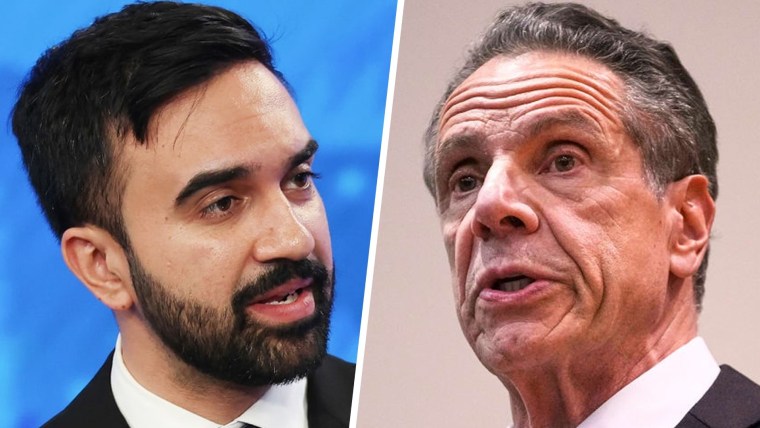In the liberal press, the long-running conventional wisdom about state Assemblyman Zohran Mamdani’s bid for mayor of New York has been that his refusal to temper his strident criticism of Israel is a political liability. Now, as the general election approaches, a candidate in the mayoral race is changing his position on Israel. But it’s not Mamdani; it’s his rival, former New York Gov. Andrew Cuomo, who lags behind Mamdani by double digits. Cuomo, who has been a pro-Israel stalwart, is now holding Israel at arm’s length. His pivot is a remarkable development that reflects how Mamdani’s campaign has subverted the most basic assumptions about Israel’s popularity with the Democratic base.
Cuomo is now in the final weeks of his struggling campaign, and The New York Times reported Monday that his position on Israel had begun to “shift.” The newspaper reported that in an interview with the Times, Cuomo was “willing to question the war effort” in a manner he had not done before in his campaign. Cuomo told the Times, “There is no doubt that the people of New York and the nation see the continued carnage that is happening and are deeply, deeply disturbed and want it over, and believe it has gone on way too long.” He added, “It should end today. Return the hostages, end the violence. Today. I think it should have been over months ago. It is horrific.”
It’s possible that Cuomo’s changing position on Israel reflects that he’s finally sensed a change in the winds.
Cuomo’s softening of his position on Israel is a shock because the longtime politician has described himself as someone who has always been a “hyper-aggressive” supporter of Israel. In the Democratic mayoral primary, Cuomo tried to make Mamdani’s criticism of Israel a focal point of his case against him. During a debate, Cuomo said his first foreign trip as mayor would be to Israel — and then tried to hammer Mamdani for saying he wanted to stay in the city instead of saying the same. In November, as Israel perpetrated genocide in Gaza, Cuomo announced that he had joined a legal team to protect Israeli Prime Minister Benjamin Netanyahu from arrest warrants for war crimes issued by the International Criminal Court. That’s why his claim in his latest interview with the Times — “I never stood with Bibi” — is preposterous. (According to the Times, “Cuomo said he had been interested in making an argument about [International Criminal Court] jurisdiction, not about the merits of claims that Mr. Netanyahu has committed war crimes,” which is absurd because of the political signaling inherent in his decision.)

Cuomo’s attempt to use Mamdani’s criticisms of Israel as a way to hurt his standing with New Yorkers — and especially Jewish New Yorkers — failed spectacularly. Mamdani not only thrashed Cuomo in the Democratic primary, but he did so with significant Jewish support. And polls this summer for the general election, in which Cuomo is running as an independent, have continually shown Mamdani as the extremely dominant front-runner — and leading among Jewish New Yorkers. Mamdani’s success has exploded the problematic prevailing belief in the Democratic establishment — often echoed in legacy media framing — that holds that criticism of Israel will alienate large numbers of Democratic voters and that Jewish voters monolithically support the Israeli government.
Considering that the mayor of New York has no role in U.S. foreign relations, it is bizarre that a recent New York Times / Sienna University survey recently asked registered New York City voters which mayoral candidate they think has best addressed the Israeli-Palestinian conflict. But the results only underscore how much Mamdani has toppled the accepted wisdom: Mamdani led with 39% of voters, followed by 17% for Cuomo, and then just 10% for New York Mayor Eric Adams, who is running for re-election, also as an independent.
It’s possible that Cuomo’s changing position on Israel reflects that he’s finally sensed a change in the winds, and has determined that it is not in his interest to appear to be in total lockstep with Israel as it annihilates Gaza. The change could theoretically cost Cuomo support from conservatives — but he knows the city’s voter base is dominated by the younger, left-leaning kinds of New Yorkers who are currently enthralled by Mamdani.
To be clear, Cuomo’s softening on Israel hardly puts him in the ranks of serious Israel critics. It’s easy to decry bloodshed without advocating for cutting off U.S. support to Israel, which is the only realistic way to alter the country’s behavior in Gaza, and which Cuomo has not done. (Yet saying what Israel is doing is bad without calling for policies that will make Israel stop is the standard playbook for Democratic leaders.) But Cuomo’s shift in the direction of Mamdani’s position suggests that Cuomo knows that Mamdani understands New York City’s voters better than he does.

